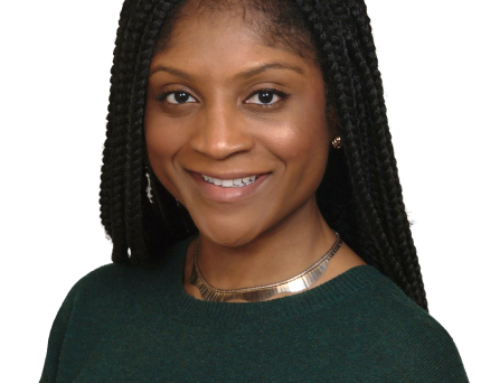Did you know that the rates of advanced colorectal cancer is increasing in adults under the age of 50, prompting changes to screening guidelines?
Gastroenterologist, Dr. Mfoniso Umoren, joins Dr. Maleeha Mohiuddin and Dr. Dionne Ibekie to discuss why this trend is happening, warning signs, and what you can do to lower your cancer risk. Join them as they walk through the screening options so that you can choose what’s best for you!
Beat Provided By https://freebeats.io
Produced By White Hot
Dionne: We are officially in spring. It feels like a fresh turning point. I love this season, especially after the long winters here in Chicago. It’s like there’s a light at the end of this cold, cold tunnel. Finally, Maleeha, What does spring make you think of?
Maleeha: I love Spring, spring showers. The fresh crisp air birds singing watching the first little green buds appear on tree branches and daffodils pushing their way through the frozen ground. It’s like everything is alive.
Dionne: How poetic Maleeha, you and your books. Spring for me though, is about spring cleaning. And so it makes me think about colonoscopies major spring cleaning. Get it? Anyone? Anyone? No. Okay,
Maleeha: No. Boo and gross. I hate spring cleaning. But I am all about the colonoscopy screenings. Dionne. Yes. And March is colorectal cancer awareness month. And before this month ends, we absolutely have to discuss this topic. Colorectal cancer is the second deadliest cancer in the US, which sounds crazy because it’s one of the most preventable cancers with appropriate screening, and it’s highly treatable if caught early.
Dionne: Yeah. Those stats are astounding and makes me glad that we have our special guest today for this episode. Dr. Mfoniso Daniel Umoren, and a gastroenterology fellow at Georgetown University. Now gastroenterologists are doctors that specialize in the diseases and disorders that affect the digestive system. So we are thrilled to have him here to help us answer some of the most commonly asked questions about colorectal cancer screening.
INTRO
Maleeha You mean your gut? You might not know this, but anesthesiologist like Dionne and myself and gastroenterologist spend a lot of time together. I feel like I’ve learned so much about the colon because of all the time I’ve put in watching colonoscopies.
Dionne That’s so true. Maleeha I don’t know about you and funny so but do you feel like you learn a lot from us too, huh? No pressure here at all. Just wondering, you know, definitely alert. Just saying you know..
Mfoniso I’ve definitely learned a lot from anesthesia. The most important lesson is when to abort the procedure.
Maleeha Ah, that’s all you need to know. Bingo, respect the airway. Now, Mfoniso over the past few years, I feel like I’ve started to see more and more younger patients with polyps or abnormal growths during their colonoscopies
Dionne Same here. But it’s not just you and me. Maleeha. This year, the American Cancer Society has reported a troubling rise in cases among younger patients, particularly in adults aged 20 to 49. Mfoniso are you seeing this in your practice?
Mfoniso Yes, absolutely. The American Cancer Society reported that Americans younger than 55, rates have nearly doubled from 11% in 1995, to about 20% in 2019. What’s more alarming is the advanced stage diagnosis and deaths that are climbing to younger patients. All this is actually very troubling and concerning for us as gastroenterologist.
Dionne Wow, that’s a significant increase in younger patients and quite frankly, scary. I think there’s this assumption that colon cancer is just for old people. Why do you think this is happening in younger patients?
Mfoniso We don’t have any direct answers. We do know that colorectal cancers and obesity related cancer and also related to certain things like smoking, alcohol, processed foods. These are some of the things that are suspicious for for increasing risk of colorectal cancer. There could be also other environmental exposures as well that we did not fully understand and where we don’t actually see as much colorectal cancer in developing countries like we see in developed countries, which is very positive and we need to do more research in this area.
Maleeha Okay, so we need some ongoing research, but I want to just pinpoint what exactly do you mean by processed foods? Can you be more specific.
Mfoniso Processed food is a vague term, it could mean smoked, cured meats, sausages, canned foods, certain things or preservatives. It’s hard to really say or list all the other possibilities and although we know it’s convenient for many people We do recommend trying to limit them as much as possible.
Maleeha Okay, so that’s like all those ready to eat foods. Correct? Yeah. Try to limit it
Dionne All the good stuff. Yeah, yeah, so that’s exactly what we discussed in our episode on sudden cardiac arrest when talking about heart health, guys, be sure to check out that episode and subscribe to our podcast. Anyways, I digress. So it sounds like there’s no clear answer or data to support why the rates of cancer are going up in younger patients. The good news, if you want to call it that is unlike other cancers, at least we have tests to screen early for colorectal cancer.
Maleeha So Mfoniso, for clarity, who needs to be screened, and when should they be screened?
Mfoniso So for an average risk patient, meaning they have no family history of colorectal cancer, starting screen ages of 45 until the age of 75. After 75, we do recommend to have a conversation with your doctor about whether or not to continue screen based on comorbidities and overall health. We do however, continue screenings 85. Although the preventive task force doesn’t really strongly recommend that we screened at 85.
Maleeha Okay, and who would you consider a high risk patient and when should they screen?
Mfoniso So what’s considered high risk patient is those who have family history of colorectal cancer. And that means one first degree relatives under the age of 60 are to second degree relatives are those with genetic syndromes. Also, patients who have inflammatory bowel disease such as Crohn’s disease and ulcerative colitis, have higher risk of developing colorectal cancer due to dysplasia in the colon. So even African American men and women are considered higher risk. And prior they were getting screened at 45 of the generalized population are getting screened at 50. Until the recent guidelines changed and made everybody 45. It might change based on new data that we are expecting that African Americans might even be screened earlier, we can say for now.
Dionne Now, what if you are younger than the screening age, like a 35 year old average risk person? What symptoms should alert you that maybe you should get checked out?
Mfoniso So if you have any changes in your bowel habits, thin stools, if you notice that you’re having even dark stools or bloody stools, these are things that we should talk to your doctor that having a conversation with your primary care doctor, my prompt you being referred to a gastroenterologist, which may prompt colonoscopy based on discussion with your physician.
Maleeha Okay, so good points here, blood in the stool means go to the doctor. Now I’ve read that 1/3 of people eligible for screening just don’t do it. Why do you think that is?
Mfoniso I think awareness is a big issue. A lot of people are not having conversations with their primary care doctors, which is very important, and also fingers limited access to screening. Not everyone in the country has the same access to a gastroenterologist.
Maleeha Yeah, absolutely. And that’s where the rapport and the relationship with your doctor is so important.
Mfoniso Also, colonoscopy itself is time consuming and uncomfortable to think about something that you’re wrapped in your unconscious. I think it’s something we need to address, people might feel uncomfortable with the idea and we have to, you know, break the fears that patients have actually go into more detail about what actually happened. Essentially give them a bit of peace of mind prior to them scheduling a colonoscopy.
Dionne That’s so true. And I’d like to add, and I can personally attest and categorically say that the prep is the absolute worst part of this whole experience. I’ve had two colonoscopies the first time I drink the GoLytely. The second time, it was the suprep. And even with the suprep being less volume, it was equally as traumatic as the first time. I mean, Doc, there has to be another way there has to be.
Mfoniso Bowel preps have changed since they’ll GoLytly the big four liter bottle. We have more low volume preps like Suprep, movie prep. Yeah. And we even have pills like Sutab, which depends on what is offered to you by your insurance. A lot of times it’s good to actually have some information of the preps available and have a conversation with your gastroenterologist so they could prescribe you one that’s comfortable, and one that’s affordable. Sure.
Dionne I wish someone told me about the pill. Okay, because I’m really mad about the prep, you have no idea.
Maleeha You’re gonna have to post some of that Dionne about your colonoscopy.
Dionne I will, I will because it was traumatic for me.
Maleeha But bottom line, you need good bowel prep to get a good colonoscopy. Now we are using the word screening a lot. But I think we should drill down now and talk about what options people have when it comes to screening. Can you walk us through the different screening options Please doctor?
Mfoniso Sure. Option one being the gold standard colonoscopy, it’s the golden standard because it’s the only screening tests that actually can detect and prevent colon cancer. During the colonoscopy, I can remove a polyp, which is abnormal growth. It’s also a very sensitive test, meaning if it’s well done, you may only need to repeat once every 10 years.
Dionne So what are the cons doctor?
Mfoniso The cons include the fact that it’s a whole day process, sedation is required, you do need the day to recover. Bowel prep is necessary, it’s not fun. There’s always risk of complications such as bleeding and perforation, although very rare.
Dionne Yeah, that doesn’t sound too good. But is there a more convenient screening option? Maybe?
Mfoniso Sure. Option two is a stool based testing, which is a FIT test. The procedure is easy. It’s not invasive test, which you can do in the comfort of your home doesn’t require a bowel prep the candidate only detects blood doesn’t give you a lot of information, just tells you the problem. And it’s not helpful in early detection also has to be repeated every year. The test is positive, you have to get a colonoscopy anyway.
Maleeha Right. So you’re back to taking the bowel prep anyhow, in that situation…
Mfoniso Right. There’s also cologuard, which combines a DNA testing with the stool test, which still isn’t as good as a colonoscopy and fecal testing has some false positives, meaning they’re not always accurate.
Maleeha Okay, How about advanced imaging?
Mfoniso The third option is a CT colonography, which is fast, sensitive, doesn’t require sedation, however, it must be repeated every five years is a radiation exposure. And it can’t be done at home, you can’t remove any polyps, and you have to do the bowel prep. If the test is positive, you still have to get a colonoscopy.
Dionne Okay, so to recap, it sounds like the colonoscopy is the gold standard for a reason. It’s the only test that provides an intervention at the time of detection. That’s the important distinction between all these tests.
Maleeha Absolutely. But Dionne, I think we should emphasize that any screening is better than no screening. And also it’s very patient dependent. So let’s say you’re an older patient, or you have a medical condition, or you can’t easily fast before the procedure or undergo sedation, for some reason, or maybe you just can’t take a full day off of work and get transportation to and from the endoscopy center. That could be an issue. So in that situation, maybe the cologuard, or fecal testing is a good option. Also, sadly, insurance coverage can influence your decision as well. And that’s why having discussion with your doctor is very important.
Dionne Yeah, that’s so true. Good points. There’s a concern over what’s covered under insurance. And I’m not sure if advanced imaging is covered, which would affect a lot of people’s decision making as well.
Mfoniso Yeah, it’s important that, to notice that screening colonoscopy is covered. But if you have a colonoscopy, because you did another screening test first and it was positive, you may be billed as a diagnostic colonoscopy, which may not be fully covered. So that’s something to always consider.
Maleeha Yeah, that is a really good point. A really good point. That’s huge. And to reiterate, I feel like you should always talk to your insurance provider first, if you have any concerns about what’s being covered, and what you have to pay for out of pocket, which includes making sure your doctors are in-network. Those are all important points. Okay, so Mfoniso, you have convinced me, let’s pretend I’m your patient. Aside from the prep, are there any particular foods or drinks that I should avoid eating before a colonoscopy,
Mfoniso Of course, usually, you know, the week prior to your colonoscopy you definitely avoid a lot of rough foods, grains, seeds, high bulk High fiber foods, and the day before a colonoscopy started clear liquid diets and I say clear liquid means things that you can see through jello and broth. Try to avoid anything red orange colored like Gatorade, because we can mistake it as blood in the colon. Which you did not want.
Maleeha No, no.
Mfoniso So that’s interesting. All those foods you said to avoid or you know, usually good for your gut. So you know that’s good to know. I don’t think a lot of people know that. I don’t think I did. So those were gems you just dropped but I guess it does take a long time for those to digest which could be confusing during the study. So good pearl, good pearls.
Maleeha That is a good gem. I have also noticed in areas of the country, a gastroenterologist is not the one performing the procedure. Now where I live in Arizona, it’s mainly gastroenterologist who are doing colonoscopies. However, in other parts of the country that isn’t always the case. Is it important Infini so that the doctor be a board certified gastroenterologist?
Mfoniso Access to GI is very variable across the country and typically those that specialize in performing colonoscopy is performed 1000s or have more experienced detecting polyps. The follow up may be frequent if someone’s less experienced in performing the procedure is really hard to say. Colorectal surgeons also do colonoscopy very frequently. And if patients are don’t have access to a gastroenterologist, they kind of have to go at what they have.
Maleeha Right. The colonoscopy is very operator dependent, meaning that this is a very subjective exam. So how can I be sure that my doctor is being thorough?
Mfoniso I will try to see a gastroenterologist and I know sounds so biased.
Dionne Rep your specialty!
Mfoniso Or a doctor who does most colonoscopies in the area. colorectal surgeons, like I mentioned, they do great colonoscopies. I would also ask for for which should also include a nice picture of videos have part of your colon to ensure that all the landmarks needed to be covered are seen during your colonoscopy.
Dionne Speaking of follow up, how often do I need to have a colonoscopy?
Mfoniso Well, if your average risk with no polyps every 10 years, if you have polyps or other risk factors, like we discussed earlier, like family history of or colorectal cancer, it may be more frequent,
Dionne Right. So it’s not a simple answer. Every patient is different and it depends on who is performing the colonoscopy. But one last question, because this is a huge million, billion dollar industry and I get asked this all the time by friends and family. Are supplements like pre and probiotics helpful in preventing colorectal cancer?
Mfoniso No. At least for now. There’s not enough and I can’t speak more to that.
Maleeha All right. Point taken. All right, Dan. Again, these suggestions sound almost identical to what cardiologist Dr. Princewill said in our last episode on sudden cardiac arrest in young athletes. Plug.
Dionne Ah, I see what you did there. Maleeha wink wink. Listen to that episode, everyone.
Maleeha Yes, listen to that episode. But no, seriously, just don’t take supplements because your best friend or your co worker is taking them. You could be quite literally flushing hard earned money down the toilet.
Mfoniso Yeah, quite literally.
Dionne So let’s recap what have we learned today? Number one, colorectal cancer is one of the deadliest cancers in the United States. However, unlike many other cancers, this cancer can be prevented with early and regular screening.
Maleeha Number two, the gold standard for screening is a colonoscopy because it can remove abnormal growths before they turn into cancer. Having said that, any screening is better than no screening.
Dionne Number three. If you’re an average risk patient screening should start at age 45.
Maleeha Number four, no matter what age you are, if you notice blood in your stool or a change in your bowel movements, tell your doctor
Dionne Number five, get your colonoscopy done by the most experienced doctor in your area. They are very operator dependent and you want someone who has performed 1000s.
Maleeha Number six, there isn’t any data to support using supplements to prevent colorectal cancer. So don’t waste your money.
Dionne And last but not least number seven, try to avoid smoking alcohol and a diet of overly processed food, specifically red meat to reduce your risk of getting cancer.
Maleeha All right, well, that sums it up pretty neatly. Thank you so much Mfoniso for being with us today and answering all of these pressing questions.
Mfoniso Thank you guys for having me. It’s fun to sit down and talk to other doctors who also care about health care and prevention, hopefully move people to ask doctors about getting a colonoscopy.
Dionne For more IVY drip tips or to listen to this episode or any past episodes we have done, head to our website at TheIVYdrip.co or follow us on Instagram at theIVYdrip_podcast. Email us with your colonoscopy stories, comments and questions at info at theIVYdrip.co. We love to hear from you all. If you have a good tip, we’d love to share it in a future episode. Don’t forget to subscribe to our podcast. You can find it in all streaming platforms, leave a review and spread the love.
Maleeha Okay, so before we sign off, we have to have our tip of the day. Dr. Would you do us the honor.
Mfoniso So I want you to watch out for changes in your body if you’re noticing changes in your bowel habits. Keep a diary that details your bowel movements or your diet or you can even download a template online that’s free. Basically, include times and notes and bring it to your doctor discuss when you have the blood you still often even having blood in your stool which change in bowel habits so you can discuss what to do further.
Maleeha That’s a great tip. So you’re suggesting the Annals of the bowel diaries, get it guys.. Oh my gosh.





